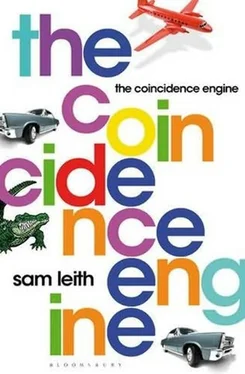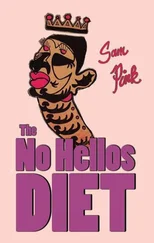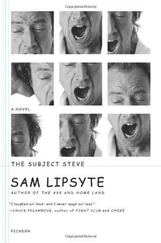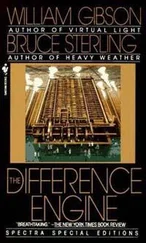Four men – all in dark overalls. They had penlights on them, and they were sweeping methodically, stealthily, down the back of the building and up the slope towards where he was hiding.
Shit. He could bolt onto the waste ground behind and risk running for it. But an image came into his head of being shot efficiently in the back. He stayed, put his head down. If they rolled him, he’d pretend to be a sleeping drunk.
He breathed as shallowly as he could. The dancing penlights, he was relieved to see, were moving up towards the ditch a little further along from where he was. Then one stopped, there was a sharp whisper, and the others converged on it. They’d found something. They were maybe six feet away.
There were now two torch beams. Two of the men had clipped off and stowed theirs to free up their hands. In the play of the light Sherman saw the men haul something up, something heavy. As it came, Sherman knew what it was. He’d seen these things hefted like that often before. They yanked it awkwardly out of the ditch, then each man hooked an arm briskly, professionally, under each armpit – another man picking up the legs. No hesitation, no alarm. One man directing.
The head flopped back as the torso came up. A splash of light flashed over it. Mouth open, eyes open, a slick darkness down one side of the neck. That was where Davidoff was.
The four men bore him away, head jouncing, round the corner of the building at speed. Sherman heard a car door close – quietly, but firmly, then another one. Then the motor started and retreated and he was left alone in the hedge in the dark. He waited there for a very long time, and then he got up, walked a long route back to his car, and drove to a new motel.
It was 4 a.m. He found a payphone and he phoned Ellis.
The first thing Ellis said was: ‘We know.’
Bree and Jones hadn’t said very much since the incident. Bree, because she was nervous. Any second she expected a siren to hiccup and whoop, and blue-red lights to revolve in the rear-view. She didn’t know how far Red Queen’s reach went, but there was only so much you could do. Someone would have found the body, she thought. Made their car from a security camera at the store – as usual, she’d ensured Jones parked with the plate towards a low wall and the car well away from the store, but there’d been only one way in and out of the parking lot.
Jones had killed. And Red Queen was leaving him in the field? Leaving Bree with him?
It made Bree feel faintly sick to think about him. That large-knuckled hand settled on the steering wheel had pushed a penknife into a man’s neck a few hours previously. And if he was upset by that he wasn’t showing it. She’d thought – when she’d found him in distress – that she’d been getting somewhere with him. She’d started to feel something towards him – protectiveness, even.
Bree looked at him as they drove through the city’s backstreets in search of somewhere to lie low. His face was expressionless and his eyes seemed to be watching something out of sight. They scanned the road; his right hand passed the wheel round to his left hand as he turned corners. He blinked, occasionally. He didn’t talk. It was as if, since the incident, there was nobody there. She felt like she was sharing the car with a ghost.
They had eaten separately and Bree had insisted they check into separate motels, a few blocks apart. She said she’d collect him in the morning and they’d go on. He could cry all he liked.
She dropped him off, took the car back, found her way into another of those rooms. It had low yellow light, like all the other motel rooms in America. There was a bedspread that made you feel sad, and the sort of mirror that turned even a young face into a landscape of pits and pocks and defeated skin. Bree could feel her DNA fraying, her cells ticking down and closing in. She looked at herself in the mirror and wondered what it was like to have fun, not to be scared, not to have to work from the time you got up until the time that, gratefully, you whimpered into sleep. She felt very, very sober.
Not that she’d sleep. The incident at the store, the sight of the dead man’s face, was going to see to that. Ever since she had been tiny, Bree had been terrified of dying and death. She hadn’t been able to visit her father in the hospital. She’d never seen a dead body. Didn’t know how anybody could do so and carry on. The very thought of it was enough to bring up a small tremor in her hands.
Whenever you read about dying in books or films it always seemed to picture it as the world darkening and growing silent and getting further away: an old television dwindling away to a white dot, starting at the edges; an inky inrushing in the vision, and the volume going down. That, Bree thought, would be nice. A nice rest.
Bree’s night terrors cast it differently. What Bree was frightened of was that far from the world going away and shutting the door politely behind it, the opposite would happen. She was worried that the drab world was the only thing standing between her and something much, much gaudier – like the flimsy curtains they put round hospital beds. When that ripped, she knew deep in her bones, the murmur of daily sense data would rise to a screaming hurricane and she would be overwhelmed, drowned, vanished, obliterated but somehow still there just to take it all in like someone with their eyelids stapled open in a violent cartoon.
When she’d gone to the Freaky Fields with Jess and Anton and taken acid in school – and boy oh boy, was that ever one of her less bright ideas – she’d had a glimpse of it, what it would be like. It had started with a lemony creeping up her cheeks – something like a grin, and they’d been talking and throwing the red ball around until her teeth started to taste funny and she heard sentences a fraction of a second before she spoke them.
The burr of the light in the yellow grass, the too several voices of her friends, the panoply of facial muscles she was expected to find uses for, the way reduplicative fragments of nonsense words and phrases started muscling into the side of her mind (‘undefunnady’, ‘downshudder’, ‘slidewise’)… she felt panic rising around her like the puddles of silvery water around her hips.
It felt like she’d been flying the light aircraft of her consciousness for years without incident, on automatic pilot. And here she was suddenly and abruptly switched to manual: strapped into the cockpit of a 737 and seeing bank after bank of winking lights and switches and multiple joysticks and tiny dials: far too much information coming in. She hadn’t needed to think about how to smile, or to pronounce the word ‘funny’, or to separate out the different information coming in from her ears, her eyes, her skin and her own thoughts.
Now the filters had been removed and she was overwhelmed. She knew then, as she set in for the long haul of a catatonically bad, never-to-be-repeated trip, that this was what dying would be like – only an infinite progression of powers worse.
She hadn’t been able to explain it well to her ex-husband, when he’d found her sweating and shaking beside him in the still hours of the morning. She hadn’t been able to explain it to the therapist he’d made her see before he’d given up on her and gone.
She hadn’t been able to explain it to her mother when it had first struck her. Everyone’s frightened of dying. Everyone. But not everyone thinks about it all the time. It was the first thing she remembered from her childhood. Fear in the bones.
She had been six years old. She knew that, because her younger brother Gill had just been born. He was lying there in his cradle up the corridor, asleep already. Bree had had her bath like always and now, with a too-big, grown-up’s towel around her shoulders and her flannel pyjama bottoms on, the pale blue ones, she was brushing her teeth in front of the mirror over the sink in her bedroom.
Читать дальше












